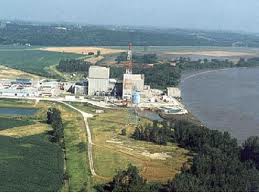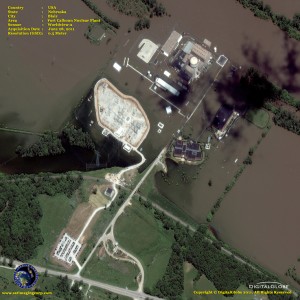Two Years Ago, April, 2011, the Fort Calhoun nuclear power station, on the banks of the Missouri River, north of Omaha, Nebraska, was shut down for refueling. It should have been a routine operation. According to the Nuclear Energy Institute, NEI.Org, here, “U.S. nuclear reactors shut down once every 18 to 24 months to refuel approximately one-third of the reactor. In the 1980s and early ’90s the average refueling outage lasted about three months. Over the past decade, refueling outage durations have improved substantially. Now a typical refueling outage lasts one month.” Clearly Fort Calhoun, shut down for refueling 28 months ago in April, 2011, is not typical.
| Nuclear Station Refueling Periods | ||
| year | Average | Median |
| 1990 | 104 days | 85 days |
| 2006 | 39 days | 37 days |
| Data from NEI.Org, here | ||
| Table 1 | ||
The NRC is requiring the Omeha Public Power District, OPPD, to implement a set of repairs. See: OPPD, Flooding Recovery Action Plan, Rev. 0, OPPD Ft Calhoun Station Integrated Performance Improvement Plan, Rev. 4, 11/1/12, or NRC Power Reactor Status Reports, Region 4.
What happened was in June, 2011, the Missouri River flooded, essentially transforming the nuclear plant into an island.
(High resolution satellite image, here.)
The flood waters have receded, however, the plant is still shut down and may remain shut down. According to Brian Mastre, WOWT local news, back in May 17, 2013, here, the plant “Is not close to a restart.” According to KVNO News, here, The operators are “Optimistic.”
However, at some point the owners of the plant will need to do a cost-benefit analysis to look at how much it will cost and how long it will take to cover the costs of upgrading the plant and bringing it back on line. The question is, how much has been spent thus far, and will need to be spent to:
- Replace the power the plant has not generated since April, 2011,
- Keep the plant cool and not-operating,
- Outsource management and operations to Exelon, and
- Repair the plant?
I too am optimistic. I think we will decommission all nuclear reactors as their operating licenses expire, and replace our fuel and waste based energy systems, built around nuclear and fossil fuels, to a sustainable energy system built around solar, wind, geothermal, hydro and biofuels. We should act with all deliberate speed.
–
A candidate for General Assembly (Site / Join / Contribute) to represent NJ Legislative District 12, which stretches from Matawan to to New Hanover and includes Old Bridge, Manalapan, Englishtown, Roosevelt, Millstone, Jackson, and various other towns (click here), and an analyst with Popular Logistics, Lawrence J. Furman holds a Bachelor’s in Biology, and an MBA in “Managing for Sustainability” from Marlboro College, Vermont. He also has experience in information technology. He can be reached at ‘Larry” at Furman For New Jersey. com.

